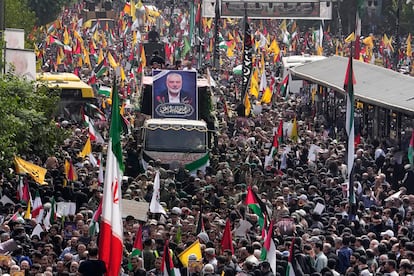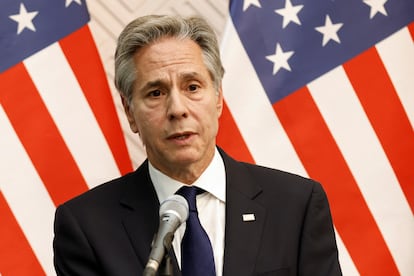International diplomacy races to avoid Mideast escalation after assassinations of Hamas and Hezbollah leaders
US State Secretary Antony Blinken urges all parties to avoid any action that could derail ceasefire negotiations in Gaza

International diplomacy is working against the clock to prevent the Middle East powder keg from exploding after the assassinations of several Hamas and Hezbollah leaders, which have brought the spiral of tension in the region to its most dangerous point in the almost 10 months of conflict in Gaza. With eyes focused on Tehran and Beirut, peacemaking efforts are coming mainly from the countries that have mediated in recent months to try to get Israel and Hamas to agree on a ceasefire that would allow the release of the Israeli hostages in Gaza and bring closer the end of the war. Among these mediators is the United States, Israel’s main ally and, at the same time, with close contacts among Gulf countries that can build bridges with Iran.
Israel is on high alert for possible responses to its attacks in Lebanon against the Lebanese militia party Hezbollah, and to the assassination in Iran of Hamas political leader Ismail Haniyeh, an action for which nobody has taken responsibility. Iran’s supreme leader, Ayatollah Ali Khamenei, has warned about a “harsh punishment” and Hezbollah has made it known that the “determination and stubbornness of the resistance fighters” will only increase after the death in an attack on its number two official, Fuad Shukr. Israel also announced on Thursday that an attack last month in Gaza killed Hamas’ military chief, Mohammed Deif.
The U.S. government, mired in a complicated election campaign, is concerned that the assassination of Haniyeh in Tehran could derail negotiations for a ceasefire in Gaza and lead to a flare-up of tensions. There are fears that the death of the leader of the radical Palestinian group’s delegation in those talks could precipitate a reaction from Iran that could trigger a regional war.
Speaking from Mongolia, where he is on a tour of Asia, Secretary of State Antony Blinken has launched an appeal to “all parties” to avoid any possible action that could fuel tensions, in an apparent message to Israel. “Right now the path that the region is on is toward more conflict, more violence, more suffering, more insecurity. And it is crucial that we break the cycle, and that starts with a ceasefire that we’ve been working on and I believe is not only achievable; it has to be achieved,” he said. “It all starts with a ceasefire, and to get there it also first requires all parties to stop taking any escalatory actions. It also requires them to find reasons to come to an agreement, not to look for reasons to delay or say no to the agreement.”
White House National Security Communications Advisor John Kirby has also called for calm, saying on Wednesday that it is too early to know what effect Haniyeh’s killing will have on the talks. Speaking from Qatar, another key mediator in the negotiations, Prime Minister Mohamed al Thani asked skeptically on social media: “Can mediation succeed when one side kills the other’s negotiator?”

Uncertainty
The United States had said in previous days that these negotiations were closer than ever to yielding results; an assertion that it previously stated on several occasions in the past without achieving an agreement like the one that allowed the release of a handful of hostages last November and briefly halted hostilities.
For the United States, it is essential that the talks do not fail. It does not want, in any way, to be dragged into a regional conflict, especially in the final stage of a tight election campaign that will culminate in November with the presidential election. President Joe Biden, who announced his withdrawal from the race 10 days ago, is staking a large part of his legacy as U.S. president on what happens in the Middle East, and he is personally involved in efforts to reach an agreement. On Thursday, he spoke by phone with Israeli Prime Minister Benjamin Netanyahu in a conversation about “efforts to cool tensions” in which Vice President and Democratic presidential candidate Kamala Harris also participated. “We believe that there is still time and space for a diplomatic solution,” said Kirby on Wednesday.
Amid the tension, United Airlines and Delta Air Lines have cancelled flights to Israel, while the State Department is urging its citizens not to travel to Lebanon. The United States has deployed about a dozen warships in the area, including the aircraft carrier Theodore Roosevelt, according to The Washington Post, although the Pentagon has not announced any new troop movements so far.
Along with the U.S., Qatar and Egypt are leading the negotiations to try to achieve a truce in Gaza. Both have acknowledged that the assassinations of the leaders of Hezbollah and Hamas are not helping and have blamed Israel, but like Washington, neither has announced that contacts and ceasefire negotiations have ended.
In an area where none of the actors is in favor of giving in, as that would be equivalent to defeat, putting on the brakes requires the kind of time that is not available amidst the growing threats. A large-scale regional confrontation would be very difficult to walk back. That is why, in addition to the months-long ceasefire talks, a new diplomatic front is now being formed, whose mission is to go beyond the clash between Hamas and Israel and to focus efforts on preventing revenge operations from being launched from Beirut or Tehran.
With the Olympic Games underway in Paris, French President Emmanuel Macron is trying to pull the strings to contain Lebanon and Iran. On his X account, he alternates sporting glory with the role he wants to maintain as an actor in global geostrategy. “Our thoughts are with the hostages held for 300 days by Hamas. France continues to work for their release,” he wrote on Thursday. The president also spoke by telephone on Monday with the new president of Iran, Masoud Pezeshkian, whom he asked to stop promoting “destabilizing agents” in the region, in reference to Hezbollah and Hamas.
Haniyeh was killed in the Iranian capital, where he was attending Pezeshkian’s inauguration, in what amounts to a humiliation for Tehran, which directly accuses Israel of the killing. But the kind of diplomatic work mentioned by Macron cannot be carried out by Washington, which does not have direct relations with the Ayatollahs’ regime.
Amid the warlike dialectic between both sides, Israeli military sources say that with regard to the Hezbollah threat they do not want an escalation and that they are not closing the door to diplomacy, but at the same time they want to make it clear that they are prepared for a high-level frontal war.
The other hotbed of tension is Tehran. “I don’t think Iran wants a major escalation now,” said Negar Mortazavi, an Iran expert and senior analyst at the Center for International Policy, speaking to Al Jazeera.
In mid-April, in response to a bombing of its consulate in Damascus, Syria, the Ayatollahs' regime launched an unprecedented attack on Israel with more than 200 missiles and drones, but without causing any fatalities. The Israeli response, five days later, was measured and the exchange of attacks did not go any further. "I expect a similar situation again this time," Mortazavi added.
Sign up for our weekly newsletter to get more English-language news coverage from EL PAÍS USA Edition
Tu suscripción se está usando en otro dispositivo
¿Quieres añadir otro usuario a tu suscripción?
Si continúas leyendo en este dispositivo, no se podrá leer en el otro.
FlechaTu suscripción se está usando en otro dispositivo y solo puedes acceder a EL PAÍS desde un dispositivo a la vez.
Si quieres compartir tu cuenta, cambia tu suscripción a la modalidad Premium, así podrás añadir otro usuario. Cada uno accederá con su propia cuenta de email, lo que os permitirá personalizar vuestra experiencia en EL PAÍS.
¿Tienes una suscripción de empresa? Accede aquí para contratar más cuentas.
En el caso de no saber quién está usando tu cuenta, te recomendamos cambiar tu contraseña aquí.
Si decides continuar compartiendo tu cuenta, este mensaje se mostrará en tu dispositivo y en el de la otra persona que está usando tu cuenta de forma indefinida, afectando a tu experiencia de lectura. Puedes consultar aquí los términos y condiciones de la suscripción digital.








































